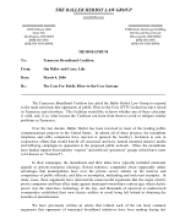Georgia Legislature to Revoke Local Authority to Build Networks
The Georgia Senate is considering SB 313, a bill that would overrule local decision-making authority in matters of broadband. Even as connections to the Internet have become essential for communities, the Georgia Legislature is poised to make it harder for communities to get the networks they need.
We saw very similar language in North Carolina pass last year after many years of lobbying by Time Warner Cable and CenturyLink. These massive companies use their lobbying clout to stop any form of competition they could face, and they are presently threatened by the examples of many communities that have built incredible next-generation networks. For instance, see the thousands of new jobs in Chattanooga that are credited to its community fiber network.
Community networks spur competition -- it is why Chattanooga got Comcast's xfinity service before Atlanta, despite Atlanta having long been prioritized over Chattanooga previously. It is why Cox Cable, which is headquartered in Atlanta, launched its upgrades in Lafayette, Louisiana -- they felt the competition pressure from a community fiber network.
Bill supporters are already claiming that this is just an attempt to level the playing field:
"The private sector is handling this exceptionally well," Rogers said. "What they don't need is for a governmental entity to come in and compete with them where these types of services already exist.






